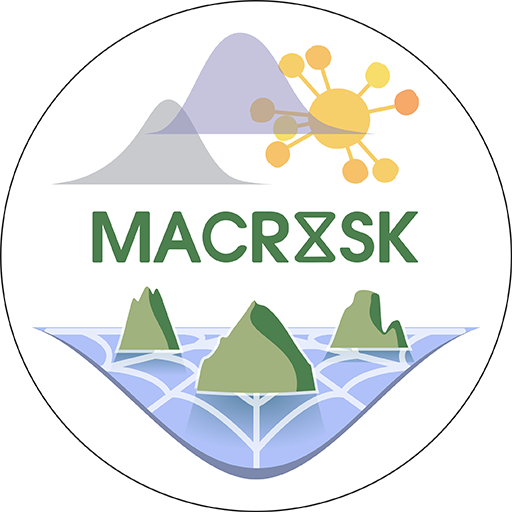MACRISK
Project Workshop
March, 14-16 2025
Join us for an insightful exploration into the traits influencing arthropod abundance and extinction risk in the Azores.
Discover groundbreaking research findings and engage in discussions that could shape future conservation strategies.
Trait-Based Insights
Uncover how specific traits predict extinction risk and abundance trends in arthropods.
Endemic Species Resilience
Learn about the unique adaptations that protect endemic species in the Azores.
Exotic Species Challenges
Understand the difficulties faced by exotic species in colonizing natural habitats.
The MACRISK project (Trait-based prediction of extinction risk and invasiveness for Northern Macaronesian arthropods) has been focusing in the study of how arthropod traits can predict abundance trends and extinction risk in the Azores archipelago.
We found interesting evidence showing that endemic traits mainly related to adaptation to the natural vegetation of the Azores offer greater protection to the species, which enhanced their abundance trends in two available time series (BALA and SLAM projects).
At the same time, exotic species, that seem to not be completely adapted to the natural forest, have been having difficulties to colonize these habitats (see recently published publication in attachment)
The final workshop of the project has the objective to present these and more of our findings, while we open for discussions related to arthropods and islands conservation. We believe that this workshop will contribute to the conservation strategies in the Azores and even in other oceanic archipelagos.
The workshop will be hybrid, in person at the University of the Azores (Angra do Heroísmo campus, Terceira island, Azores, Portugal) and through Zoom, from 14 to 16 of march, 2025
We hope you can participate.
March 14-16, 2025
Join us at the University of the Azores
Angra do Heroísmo campus, Terceira island, Portugal
or online via Zoom
This hybrid workshop will present key findings from the MACRISK project, focusing on arthropod conservation strategies in the Azores. Engage with experts and contribute to discussions on preserving biodiversity in oceanic archipelagos.
Invited Speakers
Prof. Axel Hochkirch
Department of Ecology, Musée national d’histoire naturelle de Luxembourg, Luxemburg.
Prof. Kostas Triantis
Department of Ecology and Taxonomy, University of Athens, Greece.
Prof. Michael Samways
Department of Conservation Ecology & Entomology, Stellenbosch University, South Africa.
Program
Day 1 – March, 14 2025
Day 1 Schedule
9:00h – Reception.
9:15h – Opening speeches.
Prof. Paulo Borges; cE3c- Centre for Ecology, Evolution and Environmental Changes/Azorean Biodiversity Group & CHANGE – Global Change and Sustainability Institute, Azorean Biodiversity Group, University of the Azores, Azores, Portugal.
Prof. Rosalina Gabriel; cE3c- Centre for Ecology, Evolution and Environmental Changes/Azorean Biodiversity Group & CHANGE – Global Change and Sustainability Institute, Azorean Biodiversity Group, University of the Azores, Azores, Portugal.
Doutor Luis Furtado, Pro-Reitor Campus Angra do Heroísmo University of the Azores, Azores, Portugal.
>> ZOOM LINK
Password: 181185
9:30h – Lecture. The Long-Term Project in the Azores.
Prof. Paulo Borges; cE3c- Centre for Ecology, Evolution and Environmental Changes/Azorean Biodiversity Group & CHANGE – Global Change and Sustainability Institute, Azorean Biodiversity Group, University of the Azores, Azores, Portugal.
10:00h – Lecture. Arthropod traits as proxies for abundance trends in the Azorean Islands.
Dr. Guilherme Oyarzabal; cE3c- Centre for Ecology, Evolution and Environmental Changes/Azorean Biodiversity Group & CHANGE – Global Change and Sustainability Institute, Azorean Biodiversity Group, University of the Azores, Azores, Portugal.
10:30h – Coffee break.
11:00h – Lecture. Insect conservation.
Prof. Michael Samways. Department of Conservation Ecology & Entomology, Stellenbosch University, South Africa.
11:50h – Open discussion session.
12:30h – Lunch break.
14:00h – Lecture. Red Listing on Atlantic islands
Prof. Axel Hochkirch. Department of Ecology, Musée national d’histoire naturelle de Luxembourg, Luxemburg.
14:50h – Open discussion session.
15:30h – Coffee break.
16:00h – Lecture. Extinction debt on islands.
Prof. Kostas Triantis. Department of Ecology and Taxonomy, University of Athens, Greece.
16:30h – Risk of extinction and most common threats of arthropods in the Azores.
Dr. Guilherme Oyarzabal; cE3c- Centre for Ecology, Evolution and Environmental Changes/Azorean Biodiversity Group & CHANGE – Global Change and Sustainability Institute, Azorean Biodiversity Group, University of the Azores, Azores, Portugal.
17:00h – Open discussion session.
17:30h – Day one closure
Day 2 – March, 15 2025
Day 2 Schedule
9:00h – Visit to the permanent restoration points across Terceira Island.
Meeting point for the bus at Alto das Covas, in front of Monte Brasil Hotel in Angra do Heroísmo.
Galhardo.
Reconversion of the Eucalyptus forest at Algar do Carvão.
12:30h – Lunch break. Clube de Golfe da Ilha Terceira
14:00h – Visit to the permanent restoration points across Terceira Island.
Terra Brava
Touristic visitation to Furnas do Enxofre.
17:30h – Return to Alto das Covas, in Angra do Heroísmo.
Day 3 – March, 16 2025
Day 3 Schedule
9:00h – Visit to the conservation areas in Terceira island.
Meeting point for the cars at Alto das Covas, in front of Monte Brasil Hotel in Angra do Heroísmo.
Caldeira de Santa Bárbara.
Mistérios Negros.
Rocha do Chambre
Join Us
We invite you to join us in shaping the future of conservation strategies for arthropods and island ecosystems. Your participation is crucial in driving impactful discussions and solutions.
Don’t miss this opportunity to contribute to meaningful change.
Register today and be part of the conversation!
